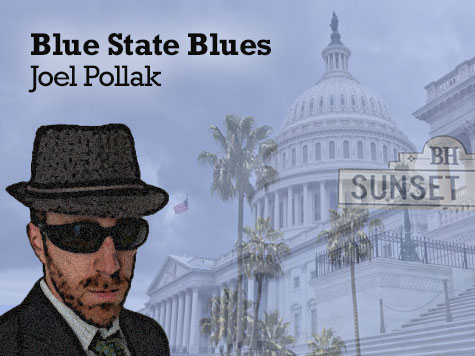Among the many dramatic events that dominated the headlines this week was an event of a private but no less dramatic nature: I survived a major car crash on Monday evening. I was driving through the calm streets of Santa Monica, taking extra care given the accidents in the news, when the light turned yellow at a small downtown intersection. I continued through, and suddenly felt a massive impact, an air bag hitting my face.
I did not know what had happened until I stepped out of the car, unharmed. A taxi driver had turned left in front of me. With both hands on the wheel and my eyes focused on the road, I had not anticipated or even seen him before the crash. Thank God, no one was harmed in the slightest way, even though his Prius was looking pretty bad and my 1995 Nissan Maxima was a complete loss. I soon walked home, three blocks away.
Since then, I have felt like a visitor from another planet, observing my own life while understanding it is not quite mine. It is a life I might not have had, were it not for God’s mysterious grace and for the fact that the 1995 Nissan Maxima was designed to withstand that collision. I owe everything to God and to an unnamed Japanese engineer who designed the car twenty years ago and who may no longer be working or even alive.
The next morning, I went to my local synagogue as usual–adding, this time, the unusual “Gomel” prayer, also known as the “Blessing of Thanksgiving.” An appropriate prayer, given the confluence of the American holiday of Thanksgiving and the Jewish holiday of Chanukah, which celebrates redemption against the odds. “Blessed art Thou, Lord our God…Who bestows good to sinners, even as He has bestowed to me every Good.”
I’ve never been more thankful for the small community of men that pray with me. One is a Holocaust survivor who saw his family murdered, and was liberated from Theresienstadt. That tends to put things in perspective. So did the words of a close friend in New York, who spent months in the hospital after being run over while crossing the street in New York: “You should feel awesome. You had the best car accident anyone ever had.”
I do feel a sense of awe, and also a tremendous sense of gratitude. I was reminded of how important so many people are to others whom they may never meet: the engineers who design the cars, the police who enforce the traffic laws, the insurance agents that make it possible to drive again after the unexpected happens. I called a high school friend who designs brakes just to thank her for the lives she will save one day.
It is worth noting that government regulations played some role in preventing injury. Without mandatory seat belts, for example, who knows how badly the taxi driver and I might have been hurt. But there are some laws that make collisions more unsafe, notably the CAFE standards for fuel efficiency that arguably make driving more dangerous by making cars lighter. (President Barack Obama now wants to raise those standards.)
Regulations require a balance. At their best, they prevent people from self-destructive behaviors that also pose dangers to others and pass along the costs to society as a whole. They can encourage technological innovation, as engineers think outside the box of profit and aesthetics and take new values into account. But at their worst, regulations can create perverse incentives and discourage such innovation, to everyone’s loss.
I often trace the early origins of my shift to conservatism back to my studies in environmental science. One of the most important experiences I had as a student was my thesis research on oil and gas development on the North Slope of Alaska. Environmental regulations had overreached in Alaska, discouraging oil development even where it could be done safely. But those regulations also prompted the industry to invent new methods.
One of those was directional drilling, which allowed a drill rig to be positioned outside a sensitive natural area, drilling diagonally and even sideways underground to reach oil without disturbing the surface environment. Another was the creation of ice roads, which could be used to transport heavy machines over the delicate tundra. When summer came and the ice had melted, there was no trace of any impact on the landscape.
The conservative ideal is not a society without regulations, but a society with the right kind of regulations–laws and rules that protect life and safety without choking opportunity or invention. We are in danger, in the age of Obamacare, of driving life-saving medical innovators out of business, of ending health insurance as millions have enjoyed it, of hurting the many to save the few–who might be helped in less destructive ways.
I am more keenly aware than ever of how much we depend on each other, not just in the U.S. but around the world. We have a duty to care for each other, on the roads and in the humble work each of us does. That duty exists prior to government, and with a few very important exceptions, does not depend on government to do much more than enforce justice. The invisible hand of man and the invisible hand of God do work together.

COMMENTS
Please let us know if you're having issues with commenting.